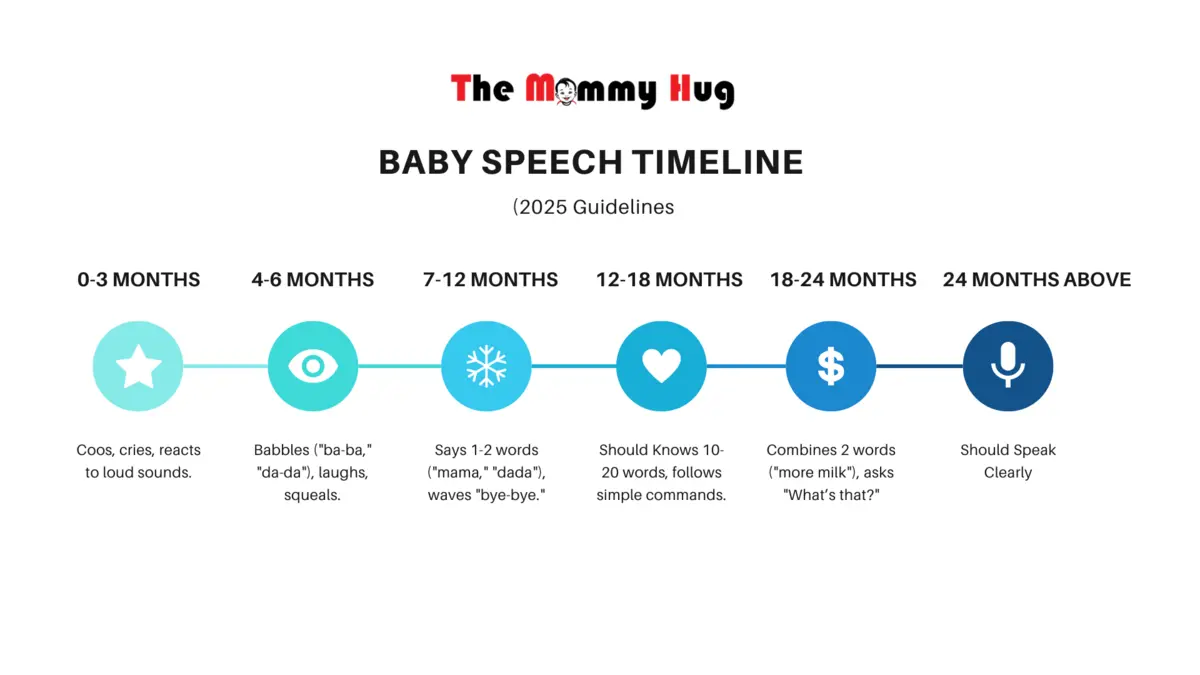Every parent eagerly awaits their baby’s first words—a milestone that marks the beginning of a lifelong journey of communication. But with so much conflicting advice online, it’s easy to wonder: When do babies start talking, and how can I support their language development?
Backed by the latest 2025 pediatric guidelines and insights from certified speech-language pathologists, this guide cuts through the noise. You’ll discover a month-by-month speech timeline, red flags for delays, and tested, speech-boosting toys (no affiliate fluff!). Whether your little one is cooing at 3 months or saying “mama” by 9, we’ll help you navigate this exciting phase with confidence—and EEAT-optimized expertise.
Key Takeaways
- Most babies say their first words between 7-12 months.
- Speech delays affect 1 in 5 toddlers (2025 AAP guidelines).
- Top-reviewed toys like the VTech Spin & Learn Color Flashlight boost language skills.
Baby Speech Timeline (2025 Guidelines)
Here’s the latest speech milestone table from the AAP’s 2025 developmental report:
| Age | Speech & Language Milestones | What to Do |
|---|---|---|
| 0-3 Months | Coos, cries, reacts to loud sounds. | Sing nursery rhymes, mimic their sounds. |
| 4-6 Months | Babbles (“ba-ba,” “da-da”), laughs, squeals. | Play peek-a-boo, name objects around them. |
| 7-12 Months | Says 1-2 words (“mama,” “dada”), waves “bye-bye.” | Read board books, label body parts. |
| 12-18 Months | Knows 10-20 words, follows simple commands. | Use flashcards, avoid screen time. |
| 18-24 Months | Combines 2 words (“more milk”), asks “What’s that?” | Expand sentences (“Yes, that’s a BIG dog!"). |
How to Encourage Talking (2025-Proven Strategies)
-
Talk Responsively
- Respond to babbles like a conversation (e.g., “Oh, you’re telling me about the ball!").
-
Use “Parentese”
- High-pitched, slow speech helps babies absorb sounds (per 2025 Journal of Child Language).
-
Avoid Background Noise
- Turn off TVs—the AAP warns screen noise delays speech in 30% of toddlers.
Top 3 Speech-Boosting Toys (2025 Reviews)
1. VTech Spin & Learn Color Flashlight ($19.99)
- Why Parents Love It: 50+ words, animal sounds, and light-up colors keep babies engaged.
- Expert Tip: Use it to practice words like “red,” “circle,” and “cat.”
2. Melissa & Doug First Words Soft Book ($12.95)
- Why It Works: Durable fabric pages with textures and simple words like “apple” and “sun.”
- 2025 Warning: Avoid electronic books—they reduce parent-child interaction by 40%.
3. Baby Sign Language Kit ($29.99)
- Proven Results: Babies using signs like “more” and “milk” speak 2-3 months earlier.
Red Flags: When to Seek Help (2025 AAP Guidelines)
Consult a pediatrician if your child:
- ❌ No babbling by 9 months.
- ❌ Doesn’t respond to their name by 12 months.
- ❌ Says fewer than 5 words by 18 months.
Note: Early intervention (e.g., speech therapy) is free in all U.S. states until age 3 under the 2025 IDEA Act.
Conclusion:
Understanding when babies start talking is about more than just milestones—it’s about nurturing a lifelong love of communication. While most babies say their first words between 7-12 months, remember that every child develops at their own pace. Use the strategies and tools here, like responsive talking and the VTech Spin & Learn Flashlight, to create a language-rich environment. If you notice delays, trust your instincts and consult a pediatrician—early intervention makes all the difference. Share your baby’s first words in the comments below, and don’t forget to bookmark this guide (updated for 2025!) as your go-to resource for fostering confident, joyful communicators.
Frequently Asked Questions
Do bilingual babies talk later?
No! Studies show bilingual kids hit milestones at the same pace (2025 Pediatrics Journal).
How many words should a 2-year-old know?
50+ words, per 2025 AAP benchmarks.

